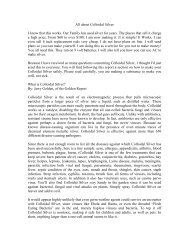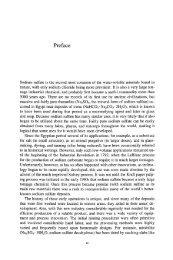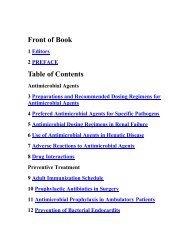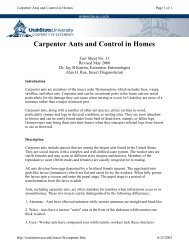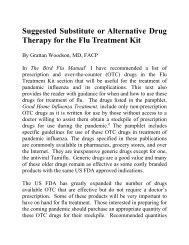The Nutritional Biochemistry of Chromium(III) - Survival-training.info
The Nutritional Biochemistry of Chromium(III) - Survival-training.info
The Nutritional Biochemistry of Chromium(III) - Survival-training.info
Create successful ePaper yourself
Turn your PDF publications into a flip-book with our unique Google optimized e-Paper software.
Clinical effect <strong>of</strong> chromium supplements on human health 169levels [40]. An additional study evaluated the effect <strong>of</strong> chromium supplementation(200 g/day for 2 months) versus placebo on blood glucose and HbA 1c in 30 patients withtype 2 diabetes and found no significant effects [41]. Similarly, another study reportedthat 6 weeks <strong>of</strong> supplementation with 200 g/day chromium in 10 patients with type2 diabetes was not significantly different from placebo in improving glucose toleranceor fasting or 2-hour serum insulin. However, 1-h serum insulin was significantly lowerwith chromium supplementation than with placebo [19].What are the differences in those studies that show a positive effect from chromiumsupplementation versus those in which a negative effect was seen? As discussed above,past studies evaluated different populations for variable periods <strong>of</strong> time. In addition, thelack <strong>of</strong> significant effects <strong>of</strong> chromium supplementation in these three studies may berelated to the relatively low chromium doses and specific formulations used for treatmentas discussed above. Abraham et al. [40] treated patients with 250 g CrCl 3 /day; Lee andReasner [41] administered 200 g CrPic/day; and Uusitupa, et al. [19] treated patients intheir trial with 200 g CrCl 3 /day. Thus, two <strong>of</strong> the three studies that failed to documentsignificant positive effects <strong>of</strong> chromium on insulin or glucose metabolism reported usingan inorganic formulation that may have been poorly absorbed. <strong>The</strong> third study useda lower dose <strong>of</strong> chromium as the picolinate formulation. <strong>The</strong>se facts underscore thepoint that the chromium formulation used and the dose suggested must be carefullyconsidered when evaluating results from studies that have assessed its metabolic effectsin individuals with or without diabetes.Gestational diabetesDiabetes can complicate pregnancy in many ways. If diabetes is present and notadequately controlled before conception, morbidity during pregnancy is clearly increased.However, diabetes during pregnancy, generally in the last trimester, is referred to asgestational diabetes. Women with gestational diabetes may revert back to euglycemiaafter delivery, but have a high rate <strong>of</strong> progression to type 2 diabetes in subsequentyears, particularly if the individual develops obesity. Very few studies have evaluatedthe use <strong>of</strong> chromium supplementation in gestational diabetes. But, it was demonstratedin a placebo-controlled study <strong>of</strong> 30 women with gestational diabetes treated with either4or8g/kg chromium picolinate or placebo that 8 weeks <strong>of</strong> chromium supplementationsignificantly decreased fasting levels <strong>of</strong> glucose, insulin, and C-peptide versusplacebo [24].Steroid-induced diabetesIt is well established that clinical use <strong>of</strong> steroids can exacerbate hyperglycemia byworsening insulin resistance. Ravina et al. [25] showed that administration <strong>of</strong> chromiumcan also reverse corticosteroid-induced diabetes in a study <strong>of</strong> only a few patients. Specifically,they treated three patients with steroid-induced diabetes with 600 g CrPic/day andreported that fasting blood glucose values fell from 250 to 150 mg/dL. <strong>The</strong> requirementfor antidiabetic drugs was also reduced by 50% in these patients.Individuals with the metabolic syndrome and impaired glucose toleranceMany individuals have additional metabolic abnormalities that, taken together,constitute what has been referred to as the metabolic syndrome. “Metabolic syndrome”describes the human condition characterized by the presence <strong>of</strong> co-existing traditional



